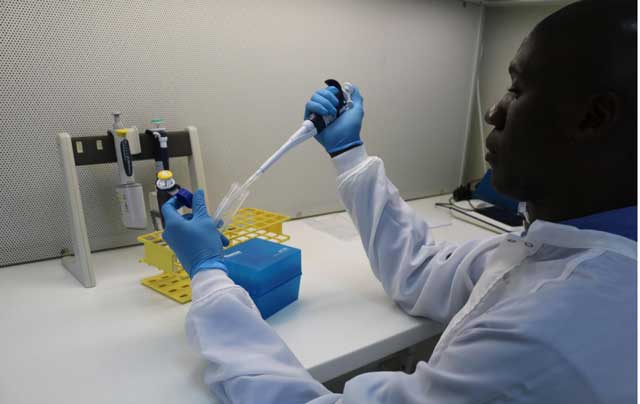
Kampala, Uganda | THE INDEPENDENT | Using genes, Makerere University based Researcher Dr. Gerald Mboowa can determine how many years it will take a person living with HIV without treatment can progress into AIDS.
Dubbed, ‘Functional host-genetic loci associated with pediatric HIV-disease progression in Uganda and Botswana”, his research reveals that after a person is infected with HIV, they are either characterized as Rapid-AIDS progressors (RP) or Long-term non-progressors (LTNP).
In an interview with Uganda Radio Network on Tuesday, Mboowa said rapid progressors develop AIDS symptoms in three years or less after infection whereas the LTNP take more than 10 years to develop symptoms without HIV-treatment.
He says he has established this through collecting and analyzing blood samples from 314 people where 173 were rapid progressors and 141 non progressors whose genes he tested to identify what is common with each of the groups.
He plans to test a total of 1000 blood samples by end of this year when he expects to present final results of his study.
In this study, which is funded by the Collaborative African Genomics Network (CAfGEN) and Training Health Researchers into Vocational Excellence in East Africa (THRiVE), Dr. Mboowa says he is prioritising children because they have a weaker immune system and challenges adhering to HIV treatment, although the findings in terms of progression is the same even in adults.
He says his findings will help health workers prioritise treatment for those in most need by focusing treatment efforts into those that can rapidly progress into AIDS especially with challenges of drug accessibility.
However, even as the government approved the test and treat policy to have whoever tests positive for HIV to be enrolled on treatment immediately, recent data from 2019 UNAIDS Uganda Country Update shows that Uganda only achieved 72% of the target.
Even as government is striving to achieve the 90% treatment target and eventually having all that test positive on treatment, Dr. Mboowa says the non progressors don’t need to start on treatment immediately as they have natural ability to stay for many years without developing symptoms in the absence of treatment.
“Prioritising treatment for those most in need will minimize exposure to side effects associated with long term use of ART among people with natural ability to stay long without developing symptoms,” he said.
When fully developed, the ‘gene test’ will be a major innovation breakthrough in screening people living with HIV and the first of its kind globally.
Looking ahead, Dr. Mboowa has developed a computer-based program that he is using to scan and detect characteristics of the gene common in both progressors and non progressors.
******
URN
 The Independent Uganda: You get the Truth we Pay the Price
The Independent Uganda: You get the Truth we Pay the Price


